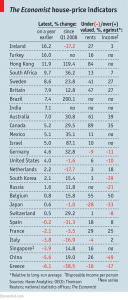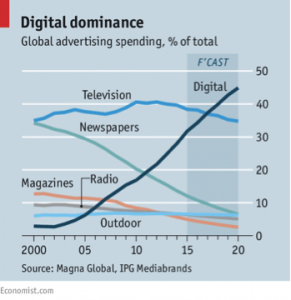 *
*
The Article “Property Puzzles” written in the economist, discusses various housing markets across the globe and how they compare in value. Of the 26 housing markets tracked by the Economist, most are seen to have an increase in market. However countries who see trends in slowing construction, provide fairly low incomes or are unpopular for immigration, are seeing a significant decline in the price for properties.
 **
**
Based on the graph above, provided by the article in the economist, a majority of countries have seen an increase in price since 2008. Yet, other countries, like China and Spain, are seen to have a substantial decline in housing prices through recent years. This is likely to due to a “decade long construction boom” coming to an end in China and the population decline in Spain. With regards to the various other countries seeing lower values in market price, it is likely that there is particular predicaments within these areas which are reflected upon there most recent real estate trends.
As stated by the article, the primary cause of fluctuations in housing markets is due to changes in income. As incomes grow or remain stable at a fairly high rate within nations, more residents will look to participate in the real estate market. This leads to a greater demand in the housing market and eventually results in a rise in price.
For example, Karma Gonjo’s article, “Influences of Political Policies in the Economy of India”, discusses various political issues within India but portrays how their struggling economy and average incomes are continuously improving each year. With regards to the article in the economist, this is reflected through their growing housing market.
It is difficult to consistently predict what will occur to the housing markets for each country. Yet, being that each individual situation is unique, it is safe to determine that countries with the highest incomes will have the highest increase in real estate prices in the long run.
An example of this is when the author describes Britains “national obsession” with property, and how individuals will go through great lengths to obtain particular housing areas. Being that Britain has a fairly stable economy, as obsession increases demand will increase as well. Due to this, rural and more populous areas in London have seen a 40% increase in housing prices over the past four years.
Although various countries will incur fluctuations within their market due to unpredictable events, their change in housing prices in the long run, will be based on income.
If a country possesses a population with stable and content incomes, it is likely that their housing markets will continuously grow, which reflects that markets successful and stabilized economy.
Word Count: 447
Sources:
http://www.economist.com/news/finance-and-economics/21648624-housing-markets-across-globe-both-underperform-and-overwhelm-property-puzzles
https://blogs.ubc.ca/karmag/
*=http://blogs.wsj.com/hong-kong/category/real-estate/
**= http://www.economist.com/news/finance-and-economics/21648624-housing-markets-across-globe-both-underperform-and-overwhelm-property-puzzles

 *
* **
** *
* **
**